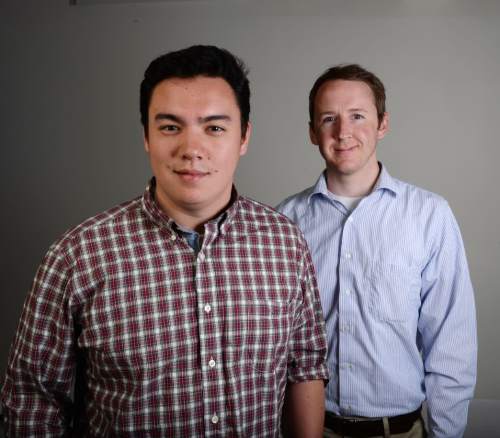This is an archived article that was published on sltrib.com in 2014, and information in the article may be outdated. It is provided only for personal research purposes and may not be reprinted.
The game begins hours beforehand for Kyle Goon and me, when Utah's football players, by ones and threes and sevens, file onto the field for knee-highs in their Beats by Dre.
They meet with old friends on the opposite team. Defensive linemen perfect their throwing motions. And we watch.
We're interested in who ISN'T out there, because for the first time all week, Utah's injured become unavoidably public knowledge on game day.
It's sort of fun, really: The child in me feels a satisfying self-importance about needing to use binoculars for my day job.
And it's probably better for Kyle and me than the alternative use of that time, which is to linger by the desserts on press row.
So, I'm not complaining.
But it's definitely a strange scene. We're yards away from people — coaches and sports information staff — who could simply tell us who's out, and instead we're scanning and rescanning clusters of players, worrying that we've missed somebody.
I don't fault Utah head coach Kyle Whittingham for his policy of not disclosing non-season-ending injuries.
If he believes there's a competitive advantage in that, well, he knows better than I do.
But I do think Pac-12 commissioner Larry Scott should require schools to produce weekly injury reports, even if it means I no longer get to play at being a spy.
Here are four good reasons:
1. It's not what the kids sign up for • After one Utah practice, a player was making a beeline for the facility, passing the local media, when a teammate reminded him that his injury status was supposed to be in doubt.
Soon, Division I wannabes may need to submit both a highlight reel and a demo reel.
A nondisclosure policy means players are asked to keep secret what ails them and their teammates.
Many, with ambitions to go pro, would do so anyway. But some players and family members are more forthcoming, and you hate to think, as a reporter, that you might get them in trouble for being honest about themselves.
They're student-athletes, not student-actors.
2. If it is an advantage, it's not fair • Whittingham isn't the only Pac-12 coach who's reticent about injuries. UCLA's Jim Mora may be most famously so, and Arizona State's Todd Graham earlier this season refused to share the injury status of quarterback Taylor Kelly.
Others are an open book, though.
Colorado, for instance, is one of a handful of Pac-12 schools that releases a weekly, NFL-style injury report without being made to do so.
Who knows why? Maybe it strikes them as unimportant, or maybe they think secrecy is futile.
But maybe they do it because it seems like the right thing to do, and if that's so, it'd be a shame if Whittingham and Mora were wise to keep quiet, and honesty cost them.
3. It creates a market for insider information • Utah allows media to observe the final 20 minutes of practice, so long as they don't report on injuries, plays, formations or the depth chart.
As long as they don't report on anything they see, basically.
All kinds of other staff watch practice, too, from nutrition to the grounds crew, and they see who's hurt and who's not, and they know things the public doesn't about the availability of Utah's key players.
It may be paranoid to worry that they'd bet based on this knowledge, or accept money for it.
I don't know.
But I've wondered.
4. It causes me to pester them • Utah's injury policy makes the aforementioned group — everybody who sees practice — fair game for questions about what they saw.
Kyle and I sit out practice (with no hard feelings) because The Tribune would rather report what we know than abide by restrictions.
When it's over, we ask the questions that you ask us — this week, it was "Will sophomore defensive end Hunter Dimick be ready for Colorado?"
To his credit, and somewhat amusingly given that he will other times claim to "never discuss injuries," Whittingham often dishes.
Or we learn about injuries elsewhere, before the binoculars become necessary.
There's an easier way to do this, though:
Make all Pac-12 schools fess up each week. Let coaches and players get back to worrying about football, and leave out some extra cookies in the press box.
Goon and I will need them.
Twitter: @matthew_piper



